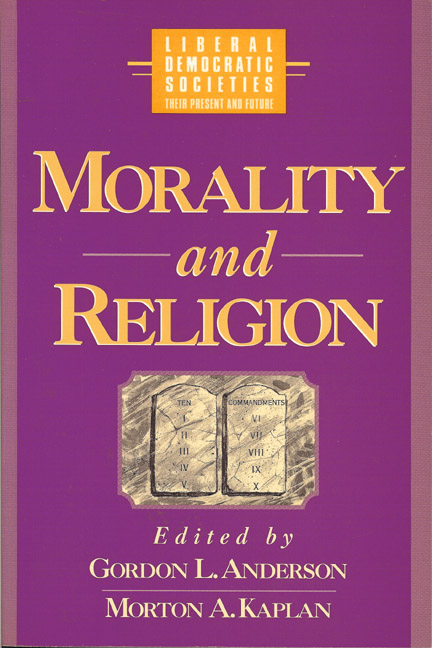In this book leading moral and religious philosophers examine the relationship of religion and morality to liberal democratic societies. In liberal democratic societies, religion has nurtured altruism, family and community life and, as such, has been the ground of civil conduct. Ironically, liberalism has undercut the very moral and religious authority it requires to function.
Morality and Religion looks at the problem of consensus on the basic issues of sexuality, family, education and community. These social institutions are the foundation of the state, yet liberal democratic societies have not attained a set of coherent values associated with them. Protestant, Catholic and Jewish experiences are examined.
The struggle for liberal democracy, individual freedom, and human and political rights historically has depended upon the moral codes of Western civilization rooted in the Judeo-Christian tradition. However in an increasing pluralistic and secular world, those codes are difficult to maintain. Without a consensus on values and the exercise of individual responsibility, liberal democratic societies and the human and political values they enshrine may become imperilled.
The problem of the relationship between morality and the liberal democratic state is examined in this volume from the perspectives of democratic theory, traditional religion, the modem state, and the evolution of religion in the post-communist world.
In the first section, on democratic theory, professors R.A.D. Grant, David Levy, Michael Perry, and Morton A. Kaplan discuss the theoretical relationship between moral values and the democratic state.
In the second section Gershon Weiler, Batista Jean Mondin, and Dean Kelley discuss the historical struggles of Judaism, Catholicism, and Protestantism with and within liberal democratic societies. The inconsistencies of many traditional religious perspectives with a culturally pluralistic society are examined.
In the following section, A. James Reichley discusses the pluralist experiment in America; George Weigle sees a new opportunity for the Catholic Church in America; John Carroll discusses the tensions of modem liberalism with culture in general; and Alain Besangon discusses the Catholic church in Europe. Possibilities for the resolution of religious perspectives within pluralistic and liberal democratic societies are examined by scholars who want both to be faithful to their traditions and to integrate them into modem democracies.
In the penultimate section of the book, Roger Scruton analyzes problems of sexual morality and identity and the liberal consensus; Geoffrey Partington discusses how the purge of traditional moral training from the public schools in liberal democracies led to inadequate character development of our youth and the outrage of parents. Morton A. Kaplan shows how the so called “right to be left alone” is invoked by the courts in a way that is destructive to social health.
In the concluding section, Milowit Kuninski looks at the future of religion
in former communist societies in which both official atheism and world
consciousness were instilled by state ideology. Gordon Anderson discusses
the evolution of religion and the value instruction in schools in the pluralistic
societies of the global democratic community that is emerging as the 21st
century approaches.
TABLE OF CONTENTS
Series Editors Foreword
Roger Michener and Edward Shils
Introduction
Gordon L. Anderson and Morton A. Kaplan
Chapter 1. Freedom for What?
R. A. D. Grant
Chapter 2. Liberalism, Politics and Anti-Politics: On the Political
Ethic of Liberal Democracy
David J. Levy
Chapter 3. The Impossibility of Neutral Politics
Michael J. Perry
Chapter 4. Philosophical Preconditions of Democratic Theory
Morton A. Kaplan
Chapter 5. The Jewish Perspective on the Interrelationship of
Church and State
Gershon Weiler
Chapter 6. Religion and Politics from a Roman Catholic Perspective
Battista Mondin
Chapter 7. The Protestant Perspective With Regard to the
Interrelationship of Church and State
Dean M. Kelley
Chapter 8. Church and State Relations: Who Is Caesar?
Alain Besancon
Chapter 9. Religion and American Democracy
A. James Reichley
Chapter 10. Catholicism and Democracy: The “Other Twentieth-Century
Revolution”
George Weigel
Chapter 11. Liberalism in Tension With Culture
John Carroll
Chapter 12. Sexual Morality and the Liberal Consensus
Roger Scruton
Chapter 13. Moral Education in Some English-Speaking Societies:
Antinomian and
Fundamentalist Challenges
Geoffrey Partington
Chapter 14. The Right to Be Left Alone Is a Right to Be No One
Morton A. Kaplan
Chapter 15. Morals in Post-Communist Societies–The Case of Poland
Milowit Kuninski
Chapter 16. Religion and Global Order
Gordon L. Anderson
Contributors
Index
GORDON L. ANDERSON is Secretary General of Professors World Peace Academy International and Editor of International Journal on World Peace. He earned his Ph.D. in Philosophy of Religion at the Claremont Graduate School. He is editor of The World Wide State of the Family and The Family in Global Transition. He has published numerous articles on Religion and Society.
MORTON A. KAPLAN is Distinguished Service Professor Emeritus of Political Science at the University of Chicago, President of Professors World Peace Academy International, and Editor and Publisher of The World & I, a publication of the Washington Times Corporation.






